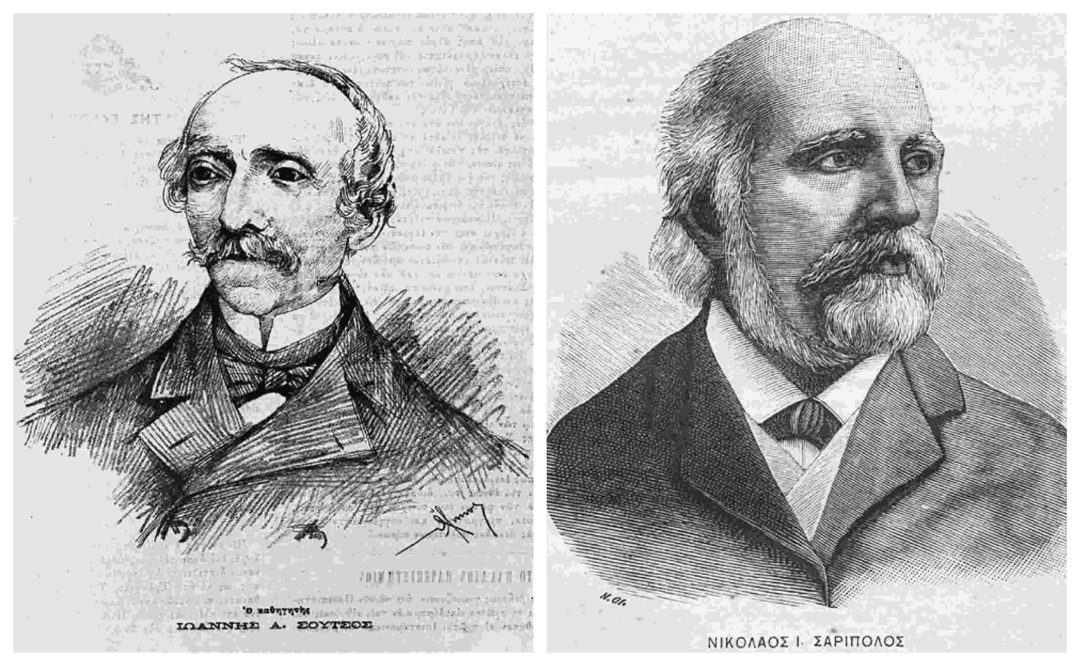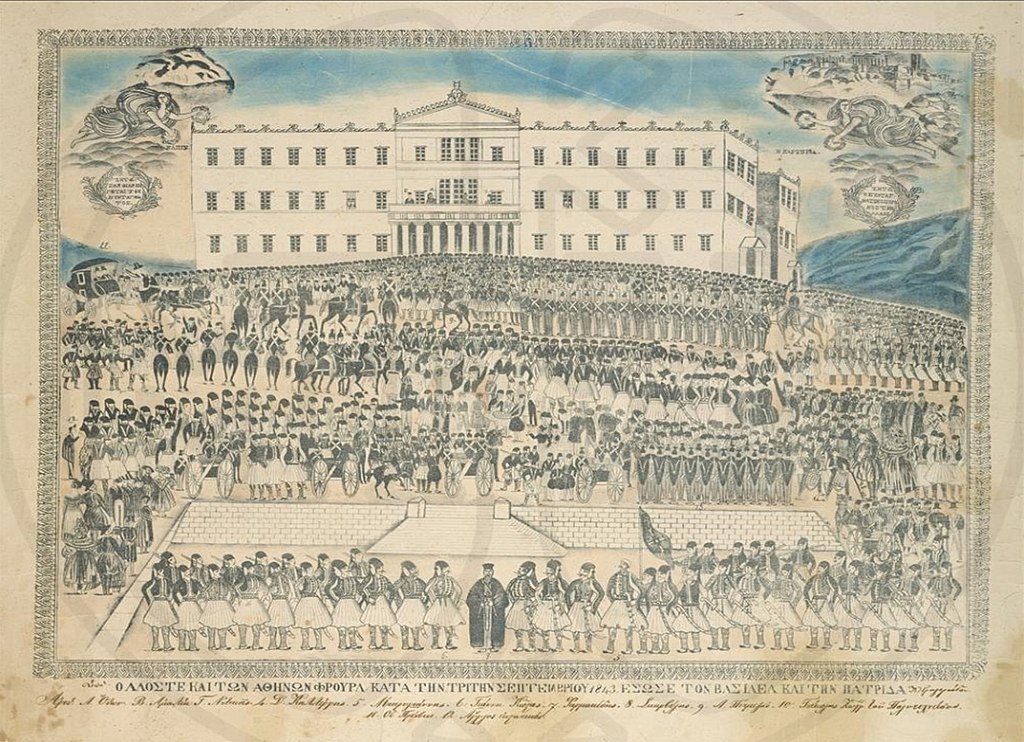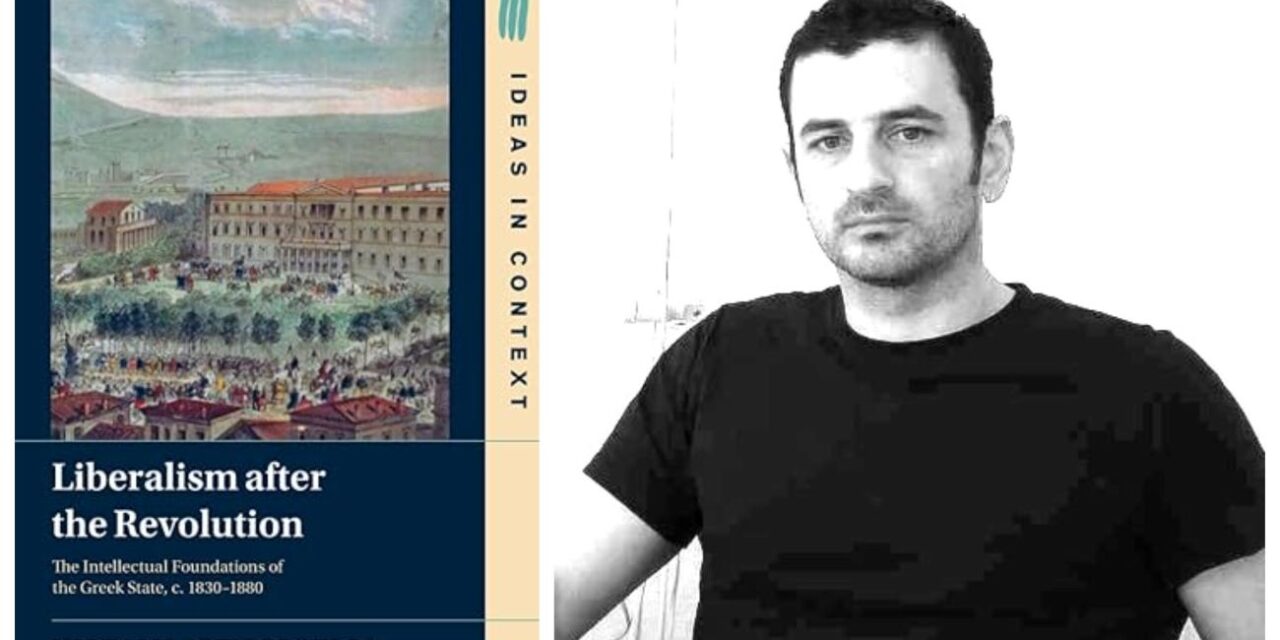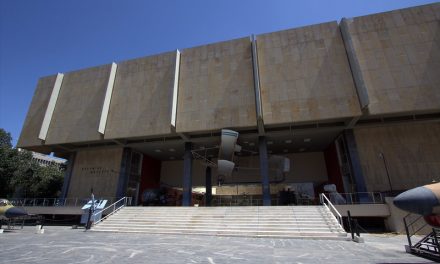The Edmund Keeley Book Prize is awarded every two years by the Modern Greek Studies Association (MGSA) to an academic book dealing with modern Greece or a Hellenic theme published originally in the English language. The 2024 Edmund Keeley Book Prize was awarded to Michalis Sotiropoulos, for his book Liberalism after the Revolution: The Intellectual Foundations of the Greek State, c. 1830-1880 (Cambridge University Press, 2023).
Sotiropoulos is a historian of Modern Europe, currently employed at the British School at Athens and a post-doctoral researcher at the University of Athens in the department of History and Philosophy of Science. His research focuses on the ‘political history of ideas’ and in particular on the ideas and the sociopolitical processes (revolts, revolutions, secessions, unifications, constitution-making and state-building) that changed the political culture and eventually the geopolitical map in the Mediterranean during the long nineteenth century. He has conceded an interview to Rethinking Greece on the intellectual origins of the Greek State, Greek liberalism and the historiography of the Greek revolution of 1821.
The announcement for the 2024 Edmund Keeley Book Prize reads: “Michalis Sotiropoulos’s Liberalism after the Revolution: The Intellectual Foundations of the Greek State, c. 1830-1880 distinguished itself among an impressive selection of books on Greece from a wide array of disciplines. It addresses three key questions concerning state formation: “How is a new state built? To what ideas, concepts and practices do authorities turn to produce and legitimise its legal and political system? And what if the state emerged through revolution, and sought to obliterate the legacy of the empire which preceded it?” (2023, cover blurb).

By focusing on the political thought of important nineteenth-century Greek legal scholars (e.g., Pavlos Kalligas, Ioannis Soutsos, Nikolaos Saripolos, and others), and, perhaps more importantly, by documenting the accuracy, depth, and subtlety of their intellectual formation, Sotiropoulos illustrates the ideological breadth, creativity, and potency of nineteenth-century Greek liberalism, as well as the way it engaged in reforms of the Greek state.
Using a plethora of original sources that were produced by the jurists themselves—articles, books, pamphlets, public statements, as well as the contributions they made to parliamentary proceedings—the author offers an original perspective on this period and its broader impact. Sotiropoulos departs from the conventional narrative of Greek state formation by challenging western-centric histories of nineteenth-century liberalism to emphasize the roots of Greek liberalism in a broader, less canonical set of international currents of thought.
While Greek liberals engaged with and were influenced by the arguments of their counterparts in Europe, they did not do so uncritically. Sotiropoulos shows that Greek legal thought and Greek liberalism were not regressive, underdeveloped, or byproducts of some kind of core (northern) European liberalism, but, on the contrary, quite broadly rooted in global conversations. As a result, the author maintains that the standard argument that nationalism predominated in the political thought of Greek liberals should be qualified. Greek liberals did not simply transform liberalism into a practical mode of statecraft; they also preserved its radical edge at a time when liberalism was losing its appeal elsewhere in Europe.

Throughout, Sotiropoulos’s writing is exquisite. His volume is carefully crafted, thorough, fair-minded, balanced, informative, and focused; it is both highly detailed and instructively comparative. Moreover, while the volume focuses on the Greek state and a relatively small handful of actors over a defined period of time (1830-1880), Michalis Sotiropoulos masterfully weaves that story into a broad, rich narrative of political thought that will have a definitive impact on future histories of southern Europe and beyond. Liberalism after the Revolution is a smart and intellectually engaging read that will prove to be a true delight to readers for years to come.”
The Committee also confers an Honorable Mention to: Elizabeth Anne Davis, Artifactual: Forensic and Documentary Knowing (Durham: Duke University Press, 2023).
As we read the editor’s page, “In Artifactual, Elizabeth Anne Davis explores how Cypriot researchers, scientists, activists, and artists process and reckon with civil and state violence that led to the enduring division of the island, using forensic and documentary materials to retell and recontextualize conflicts between and within the Greek-Cypriot and Turkish-Cypriot communities. Davis follows forensic archaeologists and anthropologists who attempt to locate, identify, and return to relatives the remains of Cypriots killed in those conflicts. She turns to filmmakers who use archival photographs and footage to come to terms with political violence and its legacies. In both forensic science and documentary filmmaking, the dynamics of secrecy and revelation shape how material remains such as bones and archival images are given meaning. Throughout, Davis demonstrates how Cypriots navigate the tension between an ethics of knowledge, which valorizes truth as a prerequisite for recovery and reconciliation, and the politics of knowledge, which renders evidence as irremediably partial and perpetually falsifiable.”

Elizabeth Davis is Professor of Anthropology. Her research and writing, grounded in the European horizons and the Ottoman history of the Greek-speaking world, focus on the intersections of psyche, body, history, and power. Her particular interest is in how the ties that bind people to communities and states are yielded and inflected by knowledge: that is, how expert and subaltern epistemologies mediate conceptions of self and others. Her first book, Bad Souls: Madness and Responsibility in Modern Greece (Duke University Press, 2012), is an ethnographic study of responsibility among psychiatric patients and their caregivers in the borderlands between Greece and Turkey. She has also written two books based on ethnographic and archival research in Cyprus. The first, Artifactual: Forensic and Documentary Knowing (Duke University Press, 2023), addresses public secrecy and knowledge projects about the violence of the 1960s-70s that led to the enduring division of Cyprus, including forensic investigations, visual archives, and documentary film. The second, The Time of the Cannibals: On Conspiracy Theory and Context (Fordham University Press, 2024), takes Cyprus as a context for rethinking conspiracy theory and political theology.
The 2024 Keeley Book Prize Committee consists of Evdoxios Doxiadis from Simon Fraser University, Laurie Kain Hart from the University of California, Los Angeles, and Neovi Karakatsanis from Indiana University South Bend, who served as Chair.
Edmund Keeley was founding member and first president of the MGSA; the eponymous award was name after him in recognition of his distinguished contributions, as pioneering translator and critic, to the broad dissemination and scholarly study of modern Greek literature in the English-speaking world and to the field of Modern Greek Studies in the United States.
The Edmund Keeley Prize will be presented at the Award Ceremony of the 28th MGSA Symposium on Thursday, October 17, 2024, in Princeton, USA.
Read more via Greek News Agenda
I.L.
TAGS: 1821 | GREEK LIBERALISM | LITERATURE & BOOKS | MODERN GREEK HISTORY














